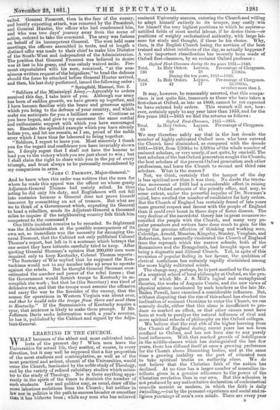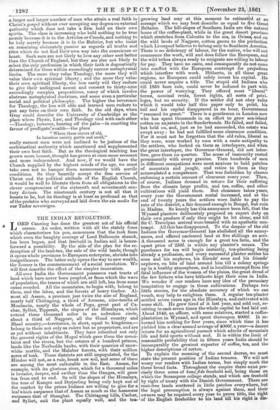LEARNING IN THE CHURCH.
liikTHAT becomes of the ablest and most cultivated intel- lects of the present day ? When men leave the Universities for actual life, they scatter, of course, in every direction, but it may well be supposed that a fair proportion of the most studious and contemplative, as well as of the most practical and ardent, alumni of the Universities, would enter the Church, fascinated by the noble study of Theology, and by the variety of refined subsidiary studies which minis- ter to the study. of Theology. Nor is there anything appa- rently in the spirit of the times to diminish the number of such students. Law and politics may, as usual, draw off the more laborious ambitions from the Church ; but neither in law nor in politics is the path to success broader or smoother than it has hitherto been ; while any man who has achieved eminent University success, entering the Church and willing to adapt himself entirely to its temper, may easily win for himself the very highest positions to which he aspires-r unfilled fields of most useful labour, if he desire them—or positions of weighty ecclesiastical authority, with large lei- sure for study and thought, if these be his choice. Why, then, is the English Church losing the services of the best trained and ablest intellects of the day, as actually happens P A very important classification has recently been made of Oxford first-classmen, by an eminent Oxford professor : Oxford First-Claestnen during the ten years 1831-1840. Total. In Holy Orders. Laymen. Per.eentage of Clergymen. 130 92 38 7/10ths. During the ten years, 1851-1860. Total. In Holy Orders. Laymen. Per-tentage of Clergymen. 119 42 77 35/100ths, or rather more than 1.
It may, however, be reasonably asserted, that this compa- rison is not quite fair, inasmuch as those who have taken first-class at Oxford, as late as 1860, cannot be yet expected to have entered holy orders. This remark will not, how- ever, certainly apply to any year later than 1855, and for the five years 1851-1855 we find the returns as follows : Oxford First-Classneen, 1851-1855. Total. In Holy Orders. Laymen. rer-centage of Clergymen. 69 28 41 We may therefore safely say that in the last decade the number of highly cultivated Oxford men who have entered the Church have diminished, as compared with the decade 1831-1840, from 7/10ths to 4/10ths of the whole number of eminent scholars, or very nearly, if not quite, by one half. The best scholars of the last Oxford generation sought the Church; the best scholars of the present Oxford generation seek other professions, and leave the Church to second and third rate scholars. What is the reason P Not, we think, certainly that the temper of the day is less spiritual now than it was then. No doubt the tracta- rian movement of 1833 had a considerable effect in raising the local Oxford estimate of the priestly office, and may, to some extent, under the powerful impulse of Dr. Newman's mind, have swelled the number of candidates for holy orders. But the Church of England has certainly found of late years more general respect and favour with the people of England than it could ever boast in those days of fierce dissent. The very decline of the Sacerdotal theory has in great measure re- conciled the people with the Church, and many very po- pular preachers and writers have done much to gain for the clergy the genuine affection of thinking and working men. Coleridge, Arnold, Maurice, Kingsley, Stanley, Vaughan, and Robertson, have assuredly vindicated the Church of England from the reproach which the narrow schools, both of the Romanizers and the Evangelicals, had brought upon her of being a dogmatic and illiberal Church. Yet, in spite of this revulsion of popular feeling in her favour, the ambition of clerical usefulness has certainly rapidly diminished among the more highly cultivated minds. The change may, perhaps, be iirpart ascribed to the growth of a sceptical school of local philosophy at Oxford, on the pro- gress of which Mr. J. S. Mill's logical and metaphysical theories, the works of Auguste Comte, and.the new views of physical science inculcated by such teachers as the late Mr. Baden Powell, have exercised a considerable influence. But, without disputing that the rise of this school has checked the inclination of eminent Oxonians to enter the Church, we can scarcely doubt, either that this alone is insufficient to pro- duce so marked an effect, or that other causes must have been at work to paralyze the natural influence of rival and more spiritual schools of philosophy on the Oxford colleges. We believe that the real ebb of the higher learning from the Church of England during recent years has not been confined to Oxford, and has not been due to any purely local influences. With that marked growth of intelligence in the middle-classes which has distinguished the last few years, there has diffused itself at once a growing preference for the Church above Dissenting bodies, and at the same time a growing inability on the part of educated men to take spiritual truths on authority alone. We do not believe that the Christian faith of the nation has declined. At no time has a larger number of masculine in- tellects given in a genuine adherence to the power of the Christian revelation than in our own. But this adhesion is not produced by any authoritative declaration of ecclesiastical councils ancient or modern, in which the faith is daily dwindling,—but by the personal experience and social and re- ligious yearnings of men's own minds. There are every year a larger and larger number of men who attain a real faith in Christ's gospel without ever accepting any dogma on external authority which does not take a firm hold on their own -spirits. The class is increasing who hold nothing to be true merely because it is in the Articles or Creeds, and nothing to be holy merely because it is in the Rubrics, but who insist on remaining obdurately passive as regards all truths and rites which do not find their own way into the conscience or heart. Such men are not likely to love any other sect better than the Church of England, but they are also not likely to select the only profession in which their faith is dogmatically determined for them within exceedingly narrow metaphysical limits. The more they value Theology, the more they will value their own spiritual liberty ; and the more they value their own spiritual liberty, the, less easily will they endure to give their unfeigned assent and consent to thirty-nine exceedingly complex propositions, many of which involve abstruse metaphysical doctrines, and some even a particular social and political philosophy. The higher the reverence for Theology, the less will able and learned men endure to put any force on their own faith. In the old days, when Gray could describe the University of Cambridge as the place where Physic, Law, and Theology vied with each other —Theology, however, bearing off the palm—in courting the favour of profligate:wealth—the place " Where three sisters of old, In harmless society guttle and scold," really earnest men were not inclined to be jealous of the ecclesiastical authority which sanctioned and supplemented their own best faith. But as the theological teaching has grown more honest, thought has grown at once more reverent and more independent. And now, if we would have the Church supplied by the highest minds of the age, we must take care not to hamper them unnecessarily with servile conditions. So they heartily accept the free service of Christ and the political attitude of the English Church, it would be well to liberate them from all obligations to the clever compromises of the sixteenth and seventeenth cen- tury divines. The nineteenth century is not all that it boasts to be, but its theology is at least as profound as that of the prelates who surveyed and laid down the via media for our Tudor sovereigns.































 Previous page
Previous page